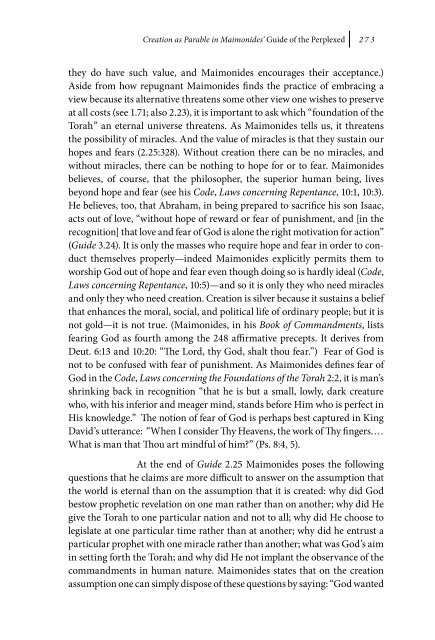Spring 2010 - Interpretation
Spring 2010 - Interpretation
Spring 2010 - Interpretation
Create successful ePaper yourself
Turn your PDF publications into a flip-book with our unique Google optimized e-Paper software.
Creation as Parable in Maimonides’ Guide of the Perplexed<br />
2 7 3<br />
they do have such value, and Maimonides encourages their acceptance.)<br />
Aside from how repugnant Maimonides finds the practice of embracing a<br />
view because its alternative threatens some other view one wishes to preserve<br />
at all costs (see 1.71; also 2.23), it is important to ask which “foundation of the<br />
Torah” an eternal universe threatens. As Maimonides tells us, it threatens<br />
the possibility of miracles. And the value of miracles is that they sustain our<br />
hopes and fears (2.25:328). Without creation there can be no miracles, and<br />
without miracles, there can be nothing to hope for or to fear. Maimonides<br />
believes, of course, that the philosopher, the superior human being, lives<br />
beyond hope and fear (see his Code, Laws concerning Repentance, 10:1, 10:3).<br />
He believes, too, that Abraham, in being prepared to sacrifice his son Isaac,<br />
acts out of love, “without hope of reward or fear of punishment, and [in the<br />
recognition] that love and fear of God is alone the right motivation for action”<br />
(Guide 3.24). It is only the masses who require hope and fear in order to conduct<br />
themselves properly—indeed Maimonides explicitly permits them to<br />
worship God out of hope and fear even though doing so is hardly ideal (Code,<br />
Laws concerning Repentance, 10:5)—and so it is only they who need miracles<br />
and only they who need creation. Creation is silver because it sustains a belief<br />
that enhances the moral, social, and political life of ordinary people; but it is<br />
not gold—it is not true. (Maimonides, in his Book of Commandments, lists<br />
fearing God as fourth among the 248 affirmative precepts. It derives from<br />
Deut. 6:13 and 10:20: “The Lord, thy God, shalt thou fear.”) Fear of God is<br />
not to be confused with fear of punishment. As Maimonides defines fear of<br />
God in the Code, Laws concerning the Foundations of the Torah 2:2, it is man’s<br />
shrinking back in recognition “that he is but a small, lowly, dark creature<br />
who, with his inferior and meager mind, stands before Him who is perfect in<br />
His knowledge.” The notion of fear of God is perhaps best captured in King<br />
David’s utterance: “When I consider Thy Heavens, the work of Thy fingers.…<br />
What is man that Thou art mindful of him?” (Ps. 8:4, 5).<br />
At the end of Guide 2.25 Maimonides poses the following<br />
questions that he claims are more difficult to answer on the assumption that<br />
the world is eternal than on the assumption that it is created: why did God<br />
bestow prophetic revelation on one man rather than on another; why did He<br />
give the Torah to one particular nation and not to all; why did He choose to<br />
legislate at one particular time rather than at another; why did he entrust a<br />
particular prophet with one miracle rather than another; what was God’s aim<br />
in setting forth the Torah; and why did He not implant the observance of the<br />
commandments in human nature. Maimonides states that on the creation<br />
assumption one can simply dispose of these questions by saying: “God wanted
















